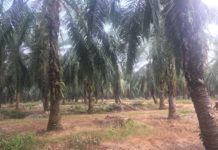Web Desk
The Pakistan Meteorological Department (PMD) has warned of a rapid increase in pollen concentration in twin cities of Rawalpindi and Islamabad due to early increase in temperature, and has projected a further increase in the count during the coming days.
“Pollen is likely to attain peak in Islamabad and Rawalpindi during the second fortnight of March, making it imperative for patients of pollen allergy to accordingly take precautionary measures,” according to an advisory issued by the department.
The most abundant pollen types in Islamabad are from 8 plant species i.e. paper mulberry, acacia, eucalyptus, pines, grasses, cannabis, dandelion, and Alternaria. Of all these plants, paper mulberry accounts for about 97% of the total pollen and its concentration touches extreme limits of around 45,000 per cubic meter of air at the peak of the blossom season.
Extremely high concentration of pollen is observed in spring (March-April) and relatively less high pollen concentration in monsoon season.
According to data available with the met department, the highest concentrations of pollens were observed in 2005 and the lowest in 2004 up till now.
The pollen grains are the male tiny particles which are released from trees, weeds, and grasses. Pollen grains function is to fertilize other parts of plants, but many never reach their targets and remain suspended in atmosphere.Most species of pollen have some level of allergenicity but not all of them.
The suspended pollen grains in the air reach the human respiratory track through inhalation, triggering a type of seasonal allergy called pollen allergy. Pollen is one of the most widespread of all the things that can cause an allergy. Many of the foods, drugs, or animals that cause allergies can be avoided to a great extent; even insects and household dust are avoidable. But staying indoors when the pollen count is very high may not help to evade windborne pollen.
Major symptoms of pollen allergy inclue: Sneezing accompanied by a runny or clogged nose, Itching eyes, nose, and throat, watering of eyes, difficulty in breathing, Conjunctivitis and sometimes asthma.













